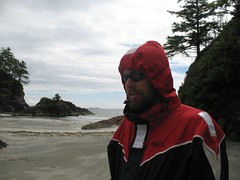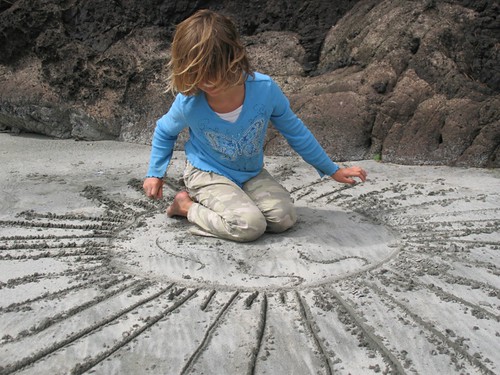Oh Yeah, We're Having Great Weather
To paraphrase Mark Twain, “The coldest winter I ever spent was summer circumnavigating Vancouver Island.” Continuing our theme of discomfort, bad weather, and demonstrated consistency in converting the adventure of a lifetime into a miserable slog, the Congers spent the summer of 2008 banging our way down the West Coast of Vancouver Island.
Novices, dreamers or non-sailors may say, “Okay... we care why?” but anyone familiar with the patterns of weather, wind, and tide which predominant the entire Pacific Coast are probably saying, “Huh?” You do not bang down the Pacific Coast; You bang up it. Banging, for those not familiar with the term, is when you turn your boat into the wind, quarter to the waves, and bang up and over every swell into the teeth of an incipient gale. It is hard on the boat, it is hard on the crew. It is difficult, nauseating, and physically exhausting. It is also slow. And it is not fun.
Typically, the winds and tide during the summer months off Vancouver Island are from the northwest. This is why cruisers circumnavigate counter clockwise. You get to the top of the island, put up your spinnaker, and drift down like fluff on on the prevailing northwesterly, surfing the waves, and enjoying the afternoon sun. Granted, mornings are full of mist and fog, cloaking the island in mystery. Yet, by midday the sun has burned through, the waters sparkle, the fish practically leap into the frying pan, and the ocean spreads out before you like a buffet of gentle rolling hills.
Unless you are Don Quixote.
In which case, you wake up to fog so thick you can’t see your buddy boat on the hook 20 yards away. Then you listen to the forecast which is just plain dismal as far into the foreseeable future as it is possible for Canadian meteorologists to speculate. After a cup of coffee, an hour or two beating the children with math and science books, and a plate of hot homemade scones, you muster the energy to weigh anchor and head out of your protected inlet into the latest southeasterly. An hour later, the sails are up, the children are down with a bad case of mal de mer, and yours truly is sitting at the helm grimly trying to take pleasure in the Daily Giz Wiz while scanning the non-existent horizon.
The wind inevitably is precisely on the nose. Being a catamaran, this means we can turn the bow towards Vladivostok and make great speed into the middle of the ocean, or we can try to point up as high as possible and bang the bows into every swell.For eight hours. More or less. Then it’s time to duck into another sound and pray desperately to the wind and sea gods that after a few days recovery, the weather will return to the regularly scheduled program of northwesterlies.
Which it didn’t, of course, and that’s the point. We, Don Quixote, cursed the entire 2008 cruising class. My sincere apologies to every other boat out here. Had we not arrived, I’m sure cosmic karma would have offered up a better plate of fronts. You’ll be happy to know, however, that if you are still out on the coast, there is hope on the horizon. Don Quixote is heading south. We’ll duck into Seattle for a few weeks bringing rain, low temperatures, and sour laundry to the Emerald City. Then we’ll head south. This absolutely ensures that the Puget Sound should experience a lovely September.
San Francisco, however, is in trouble.
Novices, dreamers or non-sailors may say, “Okay... we care why?” but anyone familiar with the patterns of weather, wind, and tide which predominant the entire Pacific Coast are probably saying, “Huh?” You do not bang down the Pacific Coast; You bang up it. Banging, for those not familiar with the term, is when you turn your boat into the wind, quarter to the waves, and bang up and over every swell into the teeth of an incipient gale. It is hard on the boat, it is hard on the crew. It is difficult, nauseating, and physically exhausting. It is also slow. And it is not fun.
Typically, the winds and tide during the summer months off Vancouver Island are from the northwest. This is why cruisers circumnavigate counter clockwise. You get to the top of the island, put up your spinnaker, and drift down like fluff on on the prevailing northwesterly, surfing the waves, and enjoying the afternoon sun. Granted, mornings are full of mist and fog, cloaking the island in mystery. Yet, by midday the sun has burned through, the waters sparkle, the fish practically leap into the frying pan, and the ocean spreads out before you like a buffet of gentle rolling hills.
Unless you are Don Quixote.
In which case, you wake up to fog so thick you can’t see your buddy boat on the hook 20 yards away. Then you listen to the forecast which is just plain dismal as far into the foreseeable future as it is possible for Canadian meteorologists to speculate. After a cup of coffee, an hour or two beating the children with math and science books, and a plate of hot homemade scones, you muster the energy to weigh anchor and head out of your protected inlet into the latest southeasterly. An hour later, the sails are up, the children are down with a bad case of mal de mer, and yours truly is sitting at the helm grimly trying to take pleasure in the Daily Giz Wiz while scanning the non-existent horizon.
The wind inevitably is precisely on the nose. Being a catamaran, this means we can turn the bow towards Vladivostok and make great speed into the middle of the ocean, or we can try to point up as high as possible and bang the bows into every swell.For eight hours. More or less. Then it’s time to duck into another sound and pray desperately to the wind and sea gods that after a few days recovery, the weather will return to the regularly scheduled program of northwesterlies.
Which it didn’t, of course, and that’s the point. We, Don Quixote, cursed the entire 2008 cruising class. My sincere apologies to every other boat out here. Had we not arrived, I’m sure cosmic karma would have offered up a better plate of fronts. You’ll be happy to know, however, that if you are still out on the coast, there is hope on the horizon. Don Quixote is heading south. We’ll duck into Seattle for a few weeks bringing rain, low temperatures, and sour laundry to the Emerald City. Then we’ll head south. This absolutely ensures that the Puget Sound should experience a lovely September.
San Francisco, however, is in trouble.

